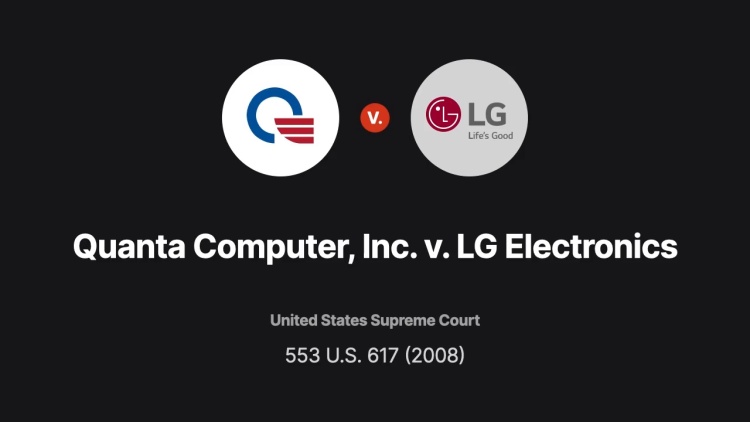Quanta Computer, Inc. v. LG Electronics, Inc.
United States Supreme Court
553 U.S. 617 (2008)
- Written by Samantha Arena, JD
Facts
LG Electronics, Inc. (LGE) (plaintiff) owned a group of computer patents that it licensed to Intel Corporation (Intel). LGE’s licensing agreement with Intel allowed Intel to manufacture and sell computer parts using LGE’s patents. This agreement also specifically stated that the license did not extend to third parties using Intel’s parts. In a related agreement, Intel further agreed to notify its customers that Intel’s licensing agreement with LGE would not extend to products made by customers using Intel components. Quanta Computer, Inc. and other computer manufacturers (defendants) purchased Intel computing components that had to be combined with certain standard parts to create a complete computing system. The defendants then combined those components with non-Intel components in the defendants’ own computer systems. The defendants’ combination of Intel and non-Intel components followed the specifications, or method, described in LGE’s patents. LGE sued the defendants for patent infringement. The defendants moved for summary judgment. The district court held that the doctrine of patent exhaustion gives purchasers the right to use or resell patented articles without infringing, and, therefore, the doctrine of patent exhaustion defeated LGE’s claim that these valid purchasers had infringed on LGE’s patents. However, the district court limited its patent-exhaustion holding to apparatus claims within LGE’s patents, holding that patent exhaustion did not apply to method claims. The appellate court affirmed the district court’s holding that patent exhaustion did not apply to method claims. The United States Supreme Court granted certiorari.
Rule of Law
Issue
Holding and Reasoning (Thomas, J.)
What to do next…
Here's why 899,000 law students have relied on our case briefs:
- Written by law professors and practitioners, not other law students. 47,000 briefs, keyed to 994 casebooks. Top-notch customer support.
- The right amount of information, includes the facts, issues, rule of law, holding and reasoning, and any concurrences and dissents.
- Access in your classes, works on your mobile and tablet. Massive library of related video lessons and high quality multiple-choice questions.
- Easy to use, uniform format for every case brief. Written in plain English, not in legalese. Our briefs summarize and simplify; they don’t just repeat the court’s language.





